ACCOUNTING CONSERVATISM AND CORPORATE TAX AVOIDANCE
DOI:
https://doi.org/10.32890/ijbf2023.18.1.3Abstract
This study investigates the effect of accounting conservatism on the corporate tax avoidance of listed non-financial firms in Nigeria. This study computes corporate tax avoidance based on the cash effective tax rate (CETR), GAAP effective tax rate (GETR) and book tax
difference (BTD). Accounting conservatism was measured using negative accruals. The study employed an ex-post factor research
design utilizing unbalanced panel data. The study covered 48 listed non-financial firms during the period between 2014 and 2020. Three regression models were developed and utilized in the study. The study has revealed that accounting conservatism has a negative and significant effect on both the GETR and BTD. It is recommended that the Financial Reporting Council of Nigeria should encourage promulgation of standards which improve conservatism in financial reporting, as it has been empirically proven to reduce tax avoidance practices by non-financial firms in Nigeria.
References
Additional Files
Published
Issue
Section
License
Copyright (c) 2023 International Journal of Banking and Finance

This work is licensed under a Creative Commons Attribution 4.0 International License.











